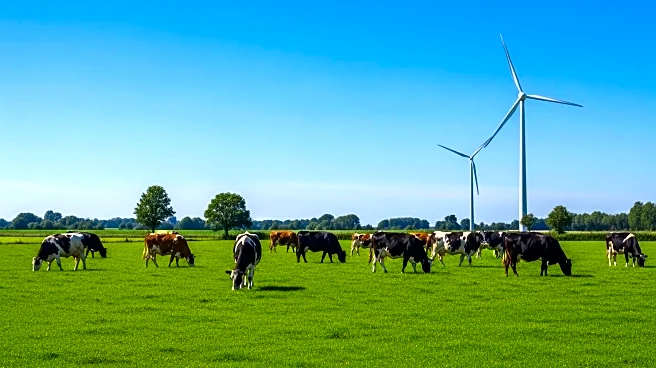What's Happening?
McDonald's USA has announced its largest-ever investment in regenerative agriculture, committing over $200 million over the next seven years. This initiative, in partnership with the National Fish and Wildlife Foundation (NFWF) and the U.S. Department of Agriculture's Natural Resources Conservation Service, aims to promote regenerative grazing practices, habitat restoration, and conservation efforts across 4 million acres of cattle ranches in up to 38 states. The Grassland Resilience and Conservation Initiative will provide ranchers with tools and resources to improve wildlife habitats, conserve water, and enhance soil health. McDonald's suppliers, including Cargill and The Coca-Cola Company, are also contributing funds to support this initiative. The program is designed to strengthen McDonald's U.S. supply chain resilience and provide economic returns to participating ranchers.
Why It's Important?
This investment by McDonald's is significant as it underscores the company's commitment to sustainable beef sourcing and environmental stewardship. By supporting regenerative agriculture, McDonald's is helping to ensure the long-term vitality of food systems, which is crucial for both ecological and economic reasons. The initiative is expected to enhance the productivity of grasslands, increase ranching profitability, and strengthen rural communities across the United States. It also highlights the potential for public-private partnerships to address environmental challenges while supporting economic growth. The program's focus on conservation practices could lead to improved water retention, better grass growth, and increased wildlife support, benefiting both the environment and the agricultural sector.
What's Next?
The first round of competitive grant-making under this initiative is expected to culminate in the announcement of awards in January 2026. NFWF will manage and invest conservation funding to support ranchers in their voluntary conservation efforts. The initiative will also involve independent monitoring and quantification of improvements to soil health by Kateri and Carbon Yield. As the program progresses, it may serve as a model for other companies looking to invest in sustainable agricultural practices, potentially leading to broader adoption of regenerative agriculture across the industry.












